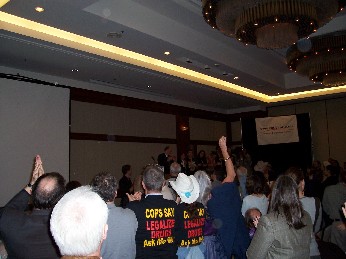Feature:
The
2005
International
Drug
Policy
Reform
Conference
in
Long
Beach,
California
11/18/05
"Who are we?" asked Drug Policy Alliance's Ethan Nadelmann as he surveyed the huge crowd at the Long Beach Westin Hotel's ballroom last week. "We are people who love drugs," he said to pleasantly surprised laughs and cheers. "They say we like drugs. It's true. Especially marijuana. Marijuana has been good for us. God put it here for a reason and we need to find a way to live with it in peace." Nadelmann paused. "But we are also people who hate drugs. We have suffered from overdoses and addiction. But we know that drugs are here to stay, and prohibition and the criminal justice system is not the way to deal with it. And we are people who don't care about drugs. People who care about the Constitution, who care about 2.2 million Americans behind bars, who care about fundamental rights and freedoms." And so opened DPA's 2005 International Drug Policy Reform conference. Nadelmann was right. While the drug reform movement unsurprisingly contains a large number of people who love their drugs, from cannabis connoisseurs to meth-makers to psychonauts, it also contains people working in the trenches of prevention and treatment (people in recovery (provision was made for AA and NA sessions during the conference), and friends and relatives of overdose victims, as well as people who have never done a drug in their lives but are propelled toward reform by personal principles ranging from libertarianism to social justice progressivism, and sometimes by idiosyncratic mixtures of the two.
It was not only people from different fields, but people from different countries. Although attendees were predominantly American, the conference earned the "international" in its title. Not only were dozens of Canadians, Europeans, and Latin American reform leaders, academics, and government officials present, the conference devoted numerous sessions to what is going on in the rest of the hemisphere and across the water. "I came here looking for coca, but it's all marijuana," laughingly complained Bolivian sociologist Silvia Natalia Rivera of the Coca and Sovereignty Campaign at a session on Latinos and Latin America. "Where's the real thing?" But quips aside, Rivera gave a brief lesson on the dynamics of coca and cocaine in Bolivia, explaining the 1982 "narcogolpe" and linking it to the CIA. "There are two things you need to make cocaine," she said. "Coca leaf and precursor chemicals. But there is also a third thing: political power, the power of corruption, the power of complicity and blackmail. 'You minister, I know your daughter snorts coke -- we have photos.'" Rivera also ripped into Bolivia's anti-coca law, Law 2008. "That law was written here in the north and had to be translated in Bolivia," she said. "It penalizes and criminalizes the coca growers, but leaves the traffickers free." The Coca and Sovereignty Campaign was born out of repression directed at growers in the Yungas in 2001, she said. "Our fundamental premise is that coca is not cocaine. One is plant, the other is a white powder that contains only one of coca's 15 alkaloids." As a long-time coca-chewer herself, Rivera was not eager to urge the gringos to crack down at home instead of attacking Bolivian peasants. "The growers want to blame the consumers, but [coca grower leader and leading presidential contender] Evo Morales and other leaders believe in harm reduction. There is an understanding that there is a problem with approaching consumption as a crime. We need to de-penalize drug consumption, and we need to make a legal zone for coca. We have designed a legal strategy -- we say in transition, but we don't say in transition to what." Mexican anthropologist and founder of the Tlachinallan Human Rights Center Abel Barrera outlined similar problems in the south-central Mexican state of Guerrero, where the Mexican government's militarization of the drug war impacts mainly poor peasants. "Opium is grown in the mountains and goes through Michoacan to the United States, but who grows it?" he asked. "It is the poor who cultivate it because they have no other option for survival. The war on drugs implemented by the Mexican government at the behest of the US is a war on the poor. The people who grow it, they don't grow large fields because they have to hide them from the helicopters, so they only get maybe one kilo of opium. That might be worth $300-700 dollars, but with that a family can live for five months -- if the father is not caught and jailed, or killed. These are the dramatic victims of the war on drugs." That same panel also heard from Mexican academic Luis Astorga, perhaps the country's leading drug policy expert, who warned of the consequences of militarization of the drug war there. "Once the civilian political structure was the center of control, but with the militarization of anti-drug efforts in Mexico -- pushed by the US -- now the armed forces are involved," said Astorga. "Now, none of the political parties are keeping an eye on this. In the worst case scenario, the armed forces could concentrate the power that previously resided in the political sector. We could imagine a harm reduction policy in Mexico as withdrawing the armed forces from the fight."
"I am really concerned about the current situation in Holland," said long-time activist August de Loor, citing Dutch government experiments aimed at restricting coffee house access to foreigners and continued rumblings from the Dutch right to just shut it all down. "For the past 30 years, we have had the space to develop the coffee shop system, the smart shop system, mushrooms, needle exchanges, Ecstasy testing, safe rave campaigns, and heroin prescription," he said, reeling off Dutch achievements. "But that space is gone now, and it's not just the Yankees. It's coming from inside." Especially from the conservative Christian Democratic government, and in particular from Justice Minister Piet Hien Donner, the strongest advocate of a reform rollback. But for Joep Oomen, head of the European Coalition for Just and Effective Drug Policies and a Dutchman living in Belgium, Holland still looks pretty good. "From the European perspective, we are still very jealous of what is going on in Holland," he told the crowd. "This conservative government would shut down the coffee shops, but the local authorities won't go along. The people of Holland have embraced this system, and Minister Donner is like the little Dutch boy with his finger in the dyke. People in Holland want to regulate and be open about it, and with a progressive government in power, we will see for the first time a country where the people have overgrown prohibition." And so it went, with attendees taking full advantage of a veritable plethora of panels and break-out sessions, with more than 100 different sessions being offered over the conference's three-day duration. From the religious use of ayahuasca to modalities of drug treatment, from psychedelic psychotherapy to drug testing, from cannabis culture to police roundtables, conference session topics covered a huge range. In fact, the main complaint about the program was that there was just too much for one person to take it all in. And not just at the panels. Dozens of booths lined the hallways, with everyone from DRCNet to the California Marijuana Party to Narconon making their pitches. (The latter organization was the object of an anonymous flyer warning DPA members that it was linked to Scientology). As at all conferences, much of the action took place in those hallways, with many happy reunions and much impromptu debate. The conference also served as a vehicle for other organizations' business. Students for Sensible Drug Policy held its national conference at the hotel at the same time, electing new non-student board members, while the Latin American and Caribbean anti-prohibitionist umbrella group REFORMA met informally to plot strategy for next year and beyond. Thanks to the largesse of the Angelica Foundation, which sponsored scholarships for Mexican attendees, REFORMA, which is based mainly in South America, was able to strengthen connections with allies and make new connections with potential allies to the north. It was the gray-haired veterans of Law Enforcement Against Prohibition who made the biggest group impression in Long Beach. Dressed uniformly in their trademark t-shirts announcing "Cops Say Legalize Drugs, Ask Me Why," the LEAP people were determined both to make their presence known and to expand the group into a mass membership organization. In addition to educating the audience in panels like "Law Enforcement and Reform," LEAP members like group head Jack Cole, group inspiration Peter Christ, and former Seattle police chief Norm Stamper relentlessly worked the crowd between sessions, cornering people and insisting they sign up. And with the nifty gold LEAP police badges they were handing out, people were glad to join. But while the conference was notable for its size, its internationalist complexion, and the strong (and for a change, friendly) police presence, if any overarching theme emerged it was the necessity of coming to grips with the role of race in the drug war. While those communities most victimized by drug prohibition are poor and black or brown, the drug reform movement is still -- if attendance at Long Beach is any indication -- overwhelmingly white and middle-class. Not only did DPA place the drug-race nexus firmly on the agenda with several panel discussions, it also gave the issue a plenary session pulled together at the last minute based on the currents coursing through the gathering. Former American Civil Liberties Union head Ira Glasser led off the session with a civil rights history lesson, reminding the audience that Rosa Parks, recently buried with great honors, was not seen as a hero the day she refused to give up her seat on a Montgomery city bus in 1955, but was "reviled and resisted." Now, said Glasser, just as discriminatory Jim Crow laws replaced slavery, drug prohibition has replaced Jim Crow as a system of racial subjugation.
The drug reform movement needs to understand the legacy and contemporary reality of racism in the US, Glasser said. "What the movement has to focus on is that even with the drug war as a system of racial subjugation, given that prohibition has become the instrument of racial oppression, it is both strategically unwise and morally reprehensible not to refashion this movement as part of the movement for social and racial justice in this country. Not to do so is to become an accomplice to that long and unending racial nightmare." That wasn't news to Cliff Thornton, leader of the Connecticut group Efficacy and sparkplug behind last month's groundbreaking Hartford conference on reforming the drug laws, but Thornton was determined to see that the rest of us got the message, too. "If you do not understand racism, classism, white privilege, terrorism, and the war on drugs, everything else will only confuse you," Thornton said. "Ten percent of the African-American population is in the criminal justice system. The drug war has placed the black community in a devolutionary state, and by dealing with the drug war, we will solve a lot of the social problems that have been plaguing us for years." But to deal with the drug war as Thornton suggested, we have to deal with each other. With this conference's emphasis on bringing blacks and brown into the movement -- or, as Glasser suggested, bringing the drug reform movement within the civil rights movement -- drug reformers have begun to take those first, belated steps.
| ||||||||||||||||||||||||||||||||||||||||||||||||||||||||||||||||||||||||||||||||||||



